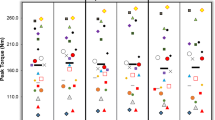Summary
Antibiotic treatment tends sometimes to result in sensations of fatigue and decreased physical performance. The effects of antibiotics were therefore studied in 50 healthy, male trainees, aged 18–25 years, assigned in a random, double-blind fashion to one of the following treatments: tetracycline, ampicillin, trimethoprim/sulphamethoxazole, placebo I and placebo II. Duration of treatment was five times the half-life of each agent and the placebo was matched accordingly. Muscle enzyme activity (serum glutamine oxaloacetate transaminase, lactate dehydrogenase, creatine phosphokinase), maximal aerobic capacity (\(\dot V\)O2max), muscle strength (MS), and rating of subjective sensation of fatigue were assessed prior to and upon conclusion of treatment. Compared to pretreatment values, plasma enzymes activity was elevated in all five groups (P<0.005). No differences in \(\dot V\)O2max or in MS were found among the subjects treated with either one of the antibiotics or those given a placebo. A significant difference in \(\dot V\)O2max was found between the groups treated for 1 day (antibiotic and placebo) and the groups treated for 3 days (antibiotic and placebo) (P<0.0001). The rating of subjective sensation was not affected by any of the agents. We concluded that in healthy individuals, a short-term antibiotic treatment had no deleterious effect on aerobic capacity or on muscle strength and was not associated with subjective side effects. The time interval between the two maximal tests could, however, have affected the aerobic capacity. Physiological disturbances associated with a sensation of fatigue following a longer period of antibiotics cannot be excluded.
Similar content being viewed by others
References
Argov Z, Mastaglia FL (1979) Disorders of neuromuscular transmission caused by drugs. N Engl J Med 301:409–413
Blain PG, Lane RJM (1983) Drugs and muscle. Ado Drug React Ac Pois Rev 2:1–24
Dvir Z (1991) Clinical applicability of isokinetics: a review. Clin Biomech 6:133–144
Furberg C, Ringqvist T (1967) Penicillin and working capacity (letter). Lancet 1:622
Galun E, Ben-Chetrite E (1984) The possible prevention of thick borne relapsing fever in patients infected with Borrelia recurrentis. J Infect Dis 150:617
Galun E, Burstein R, Assia E, Tur-Kaspa I, Rosenblum J, Epstein Y (1987) Changes of white blood cell count during prolonged exercise. Int J Sports Med 8:253–255
Galun E, Burstein R, Tur-Kaspa I, Assia E, Epstein Y (1988) Prediction of physical performance through muscle enzymes activity. Eur J Appl Physiol 57:597–600
Hermannsson J (1982) Biomedical applications. J Chromatogr 232:385–393
Kuipers H, Verstappen FTJ, Reneman RS (1980) Influence of therapeutic doses of amoxicillin on aerobic work capacity and some strength characteristics. Am J Sports Med 8:274–279
Pittinger CB, Adamson R (1972) Antibiotic blockade of neuromuscular function. Annu Rev Pharmacol 12:69–184
Torda C (1946) Effect of penicillin and sulfonamides on acetylcholine synthesis and on the response of muscle to acetylcholine and potasium. J Lab Clin Med 31:650–653
Wirght JM, Collier B (1976) The site of neuromuscular block produced by polymyxin B and rolitetracycline. Can J Physiol Pharmacol 54:926–36
Author information
Authors and Affiliations
Rights and permissions
About this article
Cite this article
Burstein, R., Hourvitz, A., Epstein, Y. et al. The relationship between short-term antibiotic treatments and fatigue in healthy individuals. Europ. J. Appl. Physiol. 66, 372–375 (1993). https://doi.org/10.1007/BF00237785
Accepted:
Issue Date:
DOI: https://doi.org/10.1007/BF00237785




